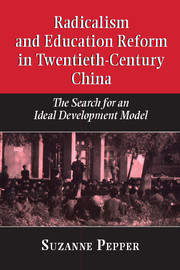Book contents
- Frontmatter
- Contents
- Acknowledgments
- 1 Educational development and the Chinese experience
- Part I The republican era: origins of radical education reform
- Part II Learning from the Soviet Union
- Part III Cultural revolution and radical education reform
- 11 On Stalin, Khrushchev, and the origins of cultural revolution
- 12 The great leap in education
- 13 A system divided: walking on two legs into the 1960s
- 14 Education reform as the catalyst for cultural revolution and class struggle: the 1966–1968 mobilization phase
- 15 Education reform as the culmination of class struggle: the professional educator's perspective
- 16 Education reform as the culmination of class struggle: the critical ideals triumphant at last
- 17 The Cultural Revolution negated
- 18 The mixed triumph of regularity
- 19 Chinese radicalism and education development
- Appendix: the Hong Kong interviews
- Select bibliography
- Index
19 - Chinese radicalism and education development
Published online by Cambridge University Press: 04 August 2010
- Frontmatter
- Contents
- Acknowledgments
- 1 Educational development and the Chinese experience
- Part I The republican era: origins of radical education reform
- Part II Learning from the Soviet Union
- Part III Cultural revolution and radical education reform
- 11 On Stalin, Khrushchev, and the origins of cultural revolution
- 12 The great leap in education
- 13 A system divided: walking on two legs into the 1960s
- 14 Education reform as the catalyst for cultural revolution and class struggle: the 1966–1968 mobilization phase
- 15 Education reform as the culmination of class struggle: the professional educator's perspective
- 16 Education reform as the culmination of class struggle: the critical ideals triumphant at last
- 17 The Cultural Revolution negated
- 18 The mixed triumph of regularity
- 19 Chinese radicalism and education development
- Appendix: the Hong Kong interviews
- Select bibliography
- Index
Summary
Answers to questions raised at the outset can now be summarized in relatively simple terms considering the complexity of issues intervening. Those questions had multiple dimensions extending over space and backward in time while nevertheless focusing on more contemporary Chinese realities. The spatial dimension involved external perceptions, or how the international development community could have anointed China's early-1970s experience as worthy of worldwide attention and emulation when the Chinese themselves would soon declare that same experience to be devoid of even a single redeeming virtue. Confronting that question required a systematic assessment of China's early-iojos experience with educational development, which then raised additional questions about where the Chinese formula of that time came from and where it might be going.
From international dependent to Third World model
To begin with the outside world's perception, a number of hypothetical possibilities presented themselves. Most obvious was that the West had, in timehonored tradition, projected its own needs upon an idealized version of Chinese realities. The international development community's needs in this instance, however, were neither trivial nor contrived. They had evolved during a quarter century of conscious effort after World War II, building upon a prewar history extending back at least as long. Their origins seem to lay at an unrecorded point of confluence between democracy and socialism, lost somewhere in early- 20th-century time. But if the issues were not new to the 1960s and 1970s, they were at least different in degree, reemerging as a series of crises and contradictions which quickly eroded the promise of new postwar and postcolonial beginnings.
- Type
- Chapter
- Information
- Radicalism and Education Reform in 20th-Century ChinaThe Search for an Ideal Development Model, pp. 512 - 536Publisher: Cambridge University PressPrint publication year: 1996



